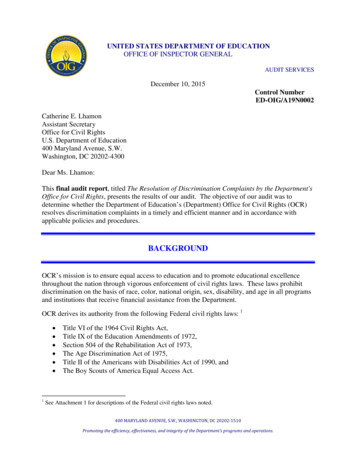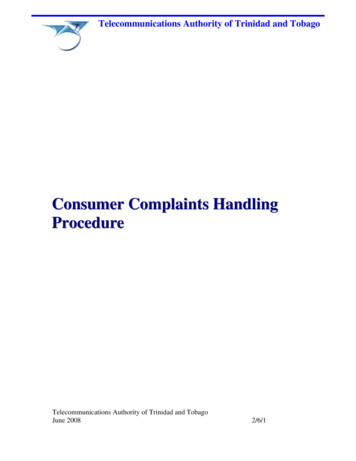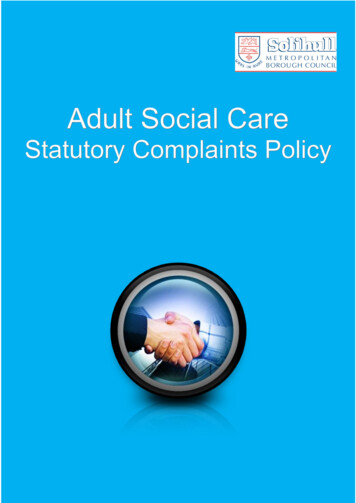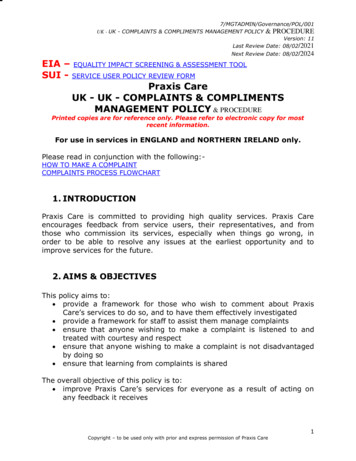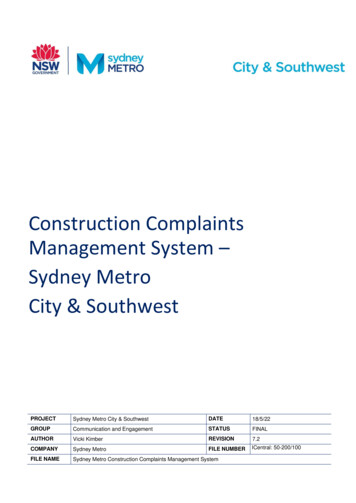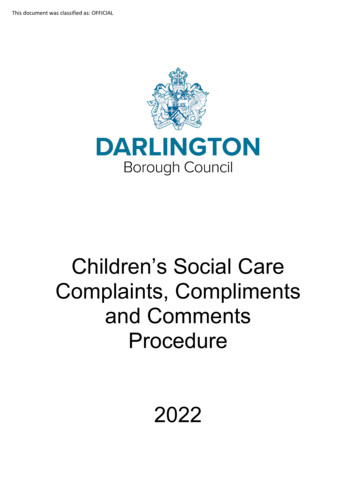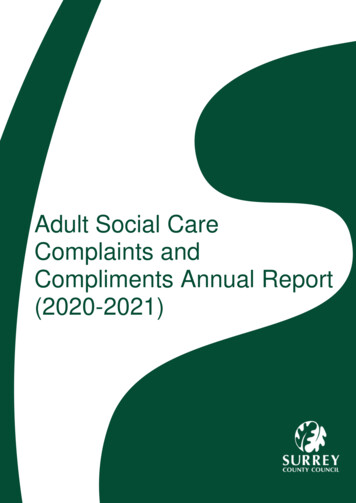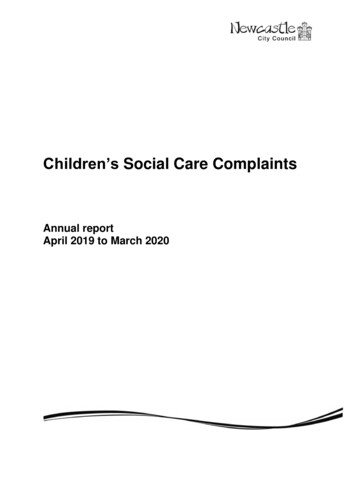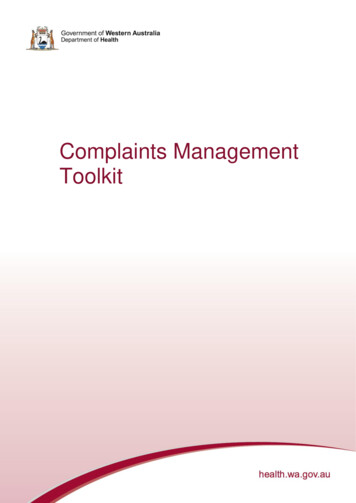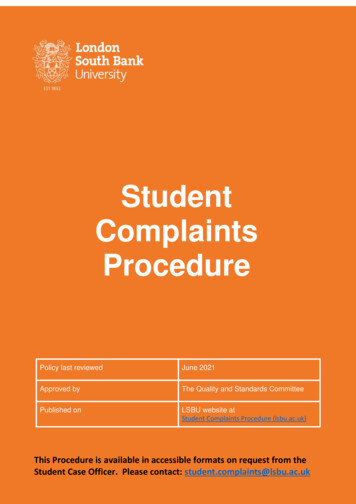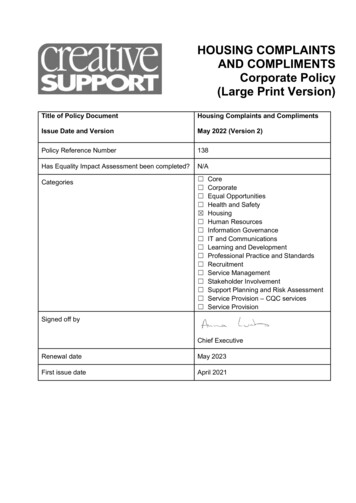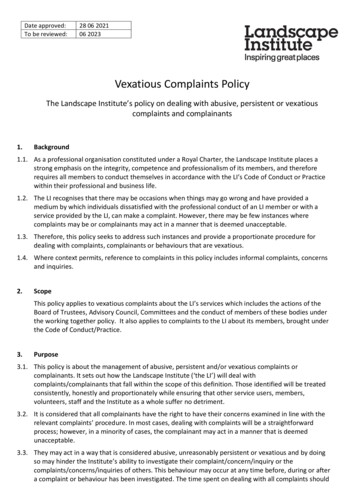
Transcription
Date approved:To be reviewed:28 06 202106 2023Vexatious Complaints PolicyThe Landscape Institute’s policy on dealing with abusive, persistent or vexatiouscomplaints and complainants1.Background1.1. As a professional organisation constituted under a Royal Charter, the Landscape Institute places astrong emphasis on the integrity, competence and professionalism of its members, and thereforerequires all members to conduct themselves in accordance with the LI’s Code of Conduct or Practicewithin their professional and business life.1.2. The LI recognises that there may be occasions when things may go wrong and have provided amedium by which individuals dissatisfied with the professional conduct of an LI member or with aservice provided by the LI, can make a complaint. However, there may be few instances wherecomplaints may be or complainants may act in a manner that is deemed unacceptable.1.3. Therefore, this policy seeks to address such instances and provide a proportionate procedure fordealing with complaints, complainants or behaviours that are vexatious.1.4. Where context permits, reference to complaints in this policy includes informal complaints, concernsand inquiries.2.ScopeThis policy applies to vexatious complaints about the LI’s services which includes the actions of theBoard of Trustees, Advisory Council, Committees and the conduct of members of these bodies underthe working together policy. It also applies to complaints to the LI about its members, brought underthe Code of Conduct/Practice.3.Purpose3.1. This policy is about the management of abusive, persistent and/or vexatious complaints orcomplainants. It sets out how the Landscape Institute (‘the LI’) will deal withcomplaints/complainants that fall within the scope of this definition. Those identified will be treatedconsistently, honestly and proportionately while ensuring that other service users, members,volunteers, staff and the Institute as a whole suffer no detriment.3.2. It is considered that all complainants have the right to have their concerns examined in line with therelevant complaints’ procedure. In most cases, dealing with complaints will be a straightforwardprocess; however, in a minority of cases, the complainant may act in a manner that is deemedunacceptable.3.3. They may act in a way that is considered abusive, unreasonably persistent or vexatious and by doingso may hinder the Institute’s ability to investigate their complaint/concern/inquiry or thecomplaints/concerns/inquiries of others. This behaviour may occur at any time before, during or aftera complaint or behaviour has been investigated. The time spent on dealing with all complaints should
be proportionate to the nature of the complaint/concern/inquiry and consistent with the outcomethat is being sought; being realistic and achievable.4.Definition4.1. A vexatious complaint or behaviour is one that is pursued, regardless of its merits, solely to harass,annoy or subdue somebody; something that is unreasonable, without foundation, frivolous,repetitive, burdensome or unwarranted.4.2. Unreasonable and unreasonably persistent complainants are those complainants who, because ofthe nature or frequency of their contacts with an organisation, hinder the organisation’sconsideration of their, or other people’s, complaints/concerns/inquiries.5.Identifying Vexatious Complainants and Unreasonably Persistent Behaviours5.1. It is important to distinguish between individuals who make a number of legitimate complaintsbecause they genuinely believe something has gone wrong, and people who are simply beingdifficult. Complainants will often be frustrated and aggrieved and therefore it is important toconsider the merits of the case rather than their attitude.5.2. Complainants may be considered to be habitual or vexatious if they display two or more of thefollowing behaviours:i.Persist in pursuing a complaint/concern/inquiry where the issue has been answered or the LI’scomplaints procedure has been fully and properly implemented and exhausted.ii.Change the substance of a complaint or continually raise new issues or seek to prolong contactby continually raising further concerns or questions upon receipt of a response whilst thecomplaint is being addressed. Care must be taken not to overlook new issues, which aresignificantly different from the original complaint. These might need to be addressed as separatecomplaints.iii. Are unwilling to accept documented evidence of treatment given as being factual or denyreceiving an adequate response to their complaint even though correspondence specificallyanswering their concerns/questions has been supplied.iv. Do not clearly identify the precise issues which they wish to be investigated, despite reasonableefforts to help specify their concerns and/or where the concerns identified are not within theremit of the LI to investigate.v.Focus on a trivial matter to an extent which is out of proportion to its significance and continueto focus on this point.vi. Have threatened or used actual physical violence towards staff at any time.vii. Have in the course of addressing a registered complaint had an excessive number of contactswith the Institute placing unreasonable demands on staff.viii. Have harassed or been personally abusive or verbally aggressive on more than one occasiontowards staff dealing with their complaint.ix. Are known to have recorded meetings or face-to-face/telephone conversations without the priorknowledge and consent of other parties involved.x.Display unreasonable demands using passive aggressive tone of communications or complainantexpectations fail to accept that these may be unreasonable.xi. The tone or language of the correspondence goes beyond the level of criticism that the Instituteor its employees should reasonably expect to receive.
xii. Raising a complaint about the service received from the LI or the conduct of a member orvolunteer does not in itself constitute actions that are unreasonably habitual or vexatious.5.3. Examples of unreasonably persistent behaviour:(This list is not exhaustive, nor does one single characteristic on its own imply that the person will beconsidered as being in this category)i.Refusing to specify the grounds of a complaint, despite offers of help.ii.Refusing to cooperate with the complaints investigation process.iii. Refusing to accept that certain issues are not within the scope of the Institute’s jurisdiction orwithin the scope of a complaints procedure.iv. Insisting on the complaint being dealt with in ways which are incompatible with the adoptedcomplaints procedure or with good practice.v.Making unjustified complaints about staff who are trying to deal with the issues, and seeking tohave them replaced.vi. Changing the basis of the complaint as the investigation proceeds.vii. Denying or changing statements made at an earlier stage.viii. Introducing trivial or irrelevant new information at a later stage.ix. Raising many detailed but unimportant questions, and insisting they are all answered.x.Submitting falsified documents from themselves or others.xi. Pursuing parallel complaints on the same issue with various members of staff and/ororganisations.xii. Making excessive demands on the time and resources of staff with lengthy phone calls, emails tonumerous LI staff, or detailed letters every few days, and expecting immediate responses.xiii. Submitting repeat complaints with minor additions/variations, which the complainant insistsmake these 'new' complaints.xiv. Refusing to accept the decision; repeatedly arguing points with no new evidence.5.4. Examples of abusive and/or vexatious complainantsThe Institute will take steps to protect its volunteers and staff from LI members, members of thepublic or fellow staff and volunteers who are behaving in a way which is considered abusive and/orvexatious. This may include physical or verbal abuse and could include the following (however, thislist is not exhaustive):i.Speaking to the member of staff in a derogatory manner which causes offence.ii.Swearing, either verbally or in writing despite being asked to refrain from using such language.iii. Using threatening language towards LI staff or volunteers working on the Institutes’ behalf,provoking fear.iv. Repeatedly contacting a member of staff regarding the same matter which has already beenaddressed.
6.Managing unreasonable complaints or complainant behaviour6.1. This policy may be invoked if the Institute considers that a complainant has behaved in a mannerwhich is deemed unreasonable (see above). The Institute may take any actions against a complainantthat it considers to be reasonable and proportionate in the circumstances.6.2. In the first instance, the complaint should be referred to the Regulations Team with a summary ofwhy it is thought to be vexatious.6.3. The Regulations Team will consider the complaint, will seek advice from the Head of the relevantarea of the LI (and/or Chief Executive) and will declare the complaint as being vexatious or not.6.4. Where a complaint is not deemed to be vexatious it will be returned to the appropriate point in thecomplaints handling process.6.5. If a complaint is deemed to be vexatious the Head of Professional Regulation will respond directly tothe complainant explaining the decision and that the complaint will be closed with no further action.6.6. The Head of Professional Regulation will also consider if the making of a vexatious complaint alsorequires the application of a restriction on communication/services under the working togetherpolicy/code of conduct.6.7. The decision will be noted on the members record for future reference but any further complaintsfrom the same individual will be considered under the complaints policy as usual.6.8. Types of actions the Institute may take:i.Where the complainant tries to reopen an issue that has already been considered through one ofthe LI’s complaints procedures, they will be informed in writing that the procedure has beenexhausted and that the matter is now closed.ii.Where a decision on the complaint/concern/inquiry has been made, the complainant should beinformed that future correspondence will be read and placed on file, but not acknowledged,unless it contains important new information.iii. Limiting the complainant to one type of contact (e.g., phone, letter, email, etc.).iv. Placing limits on the number and duration of contacts with staff per week or month.v.Requiring contact to take place with a named member of staff and informing the complainantthat if they do not keep to these arrangements, any further correspondence that does nothighlight any significantly new matters will not necessarily be acknowledged and responded to,but will be kept on file.vi. Assigning a member of the Regulations Team to read the complainant’s correspondence, in orderto ensure appropriate action is taken.vii. Offering a restricted time slot for necessary calls to specified dates and timesviii. Requiring any face-to-face or online contacts to take place in the presence of a witness and in asuitable location.7.Matters to take into account before taking action7.1. Before taking a decision to invoke this policy consideration should be given to whether any furtheraction is necessary, such as:i.Consideration about whether it is appropriate to liaise with other members of staff, convene ameeting with the complainant and a senior staff member in order to seek a mutually agreeableresolution.
ii.If it is known or suspected that the complainant has any special needs then consider offering anindependent person who may assist the complainant with their communication with theInstitute.iii.Where more than one department is being contacted by the complainant, agree a crossdepartmental approach; and designate a lead person to co-ordinate the Institute’s response.7.2. Staff must be satisfied before taking any action as defined by this policy that the complainant’sindividual circumstances have been taken into account including such matters as age, disability,gender, race and religion or belief.8.Imposing restrictions8.1. Prior to imposing any restrictions, the Head of Professional Regulation (HPR) in consultation with theCEO will communicate to the complainant in writing to explain why this behaviour is causing concern,and ask them to change this behaviour. The complainant would be informed of what actions theInstitute may take if the behaviour does not change.8.2. If the complainant continues with the unreasonable behaviour the HPR will consult with the CEO toascertain whether it is necessary to impose restrictions under this policy.8.3. When a decision has been taken to apply this policy to a complainant, the HPR will contact thecomplainant in writing (and as appropriate) explaining:i.why this decision has been takenii.what action the Institute will be takingiii. the duration of that actioniv. the review process of this policy8.4. Any restriction that is imposed on the complainant’s contact with the Institute will be appropriateand proportionate and the complainant will be advised of the period of time the restriction will be inplace for.8.5. If the complainant continues to behave in a way which is deemed unacceptable then the RegulationsTeam, in consultation with the CEO, may decide to refuse all contact with the complainant and ceaseany investigation into his or her complaint.8.6. Where the behaviour is so extreme, or it threatens the immediate safety and welfare of staff, theInstitute will consider other options, for example reporting the matter to the Police or taking legalaction. In such cases, we may not give the complainant prior warning of that action.9.Appealing a decision under this Policy9.1. A complainant may wish to appeal the decision to class their complaint/concern/enquiry asvexatious. In such cases, an appeal may be made to the Honorary Secretary to review and make afinal decision.9.2. The Honorary Secretary would inform the complainant of the outcome of that review.10.New complaints by persons previously treated as being abusive, vexatious and/or unreasonablypersistent complainants.10.1. Any new complaints received from complainants who have come under this policy will be treated ontheir merits. The Institute does not support a blanket ban on genuine complaints simply becauserestrictions may be imposed upon that complainant.
11.Review11.1. The Regulations Team liaising with the CEO will review any restrictions which are imposed upon thecomplainant after three months and at the end of every subsequent three months within the periodduring which the policy is to apply.11.2. Should the decision be taken to extend the period of restriction, the complainant will be advised inwriting how the Institute plans to go about this and that the decision to restrict contact will be put inplace for a further specified period (e.g., six months). The outcome of any subsequent review will becommunicated to the complainant, outlining if the restrictions will continue to apply and if so why.11.3. If at the end of the restricted period it is considered that the complainant’s behaviour is no longerdeemed to be unreasonable, the Institute will confirm this in writing advising that the restrictionshave now been lifted.12.Record Keeping12.1. The Regulations Team will keep a record of all complainants who have been treated as beingunreasonably persistent, abusive and/or vexatious in accordance with this policy. This will includedetails of why the policy was invoked, what restrictions were imposed and for what period of time.13.Links with other policiesPlease note that this policy is not exhaustive and does not cover all forms of behaviour that may beconsidered unreasonable. In certain circumstances, it may be more appropriate to refer to the LI’sWorking Together Policy, Code of Conduct and any other policy on conduct matters approved by theBoard subsequently.
complaints may be or complainants may act in a manner that is deemed unacceptable. 1.3. Therefore, this policy seeks to address such instances and provide a proportionate procedure for dealing with complaints, complainants or behaviours that are vexatious. 1.4. Where context permits, reference to complaints in this policy includes informal .
